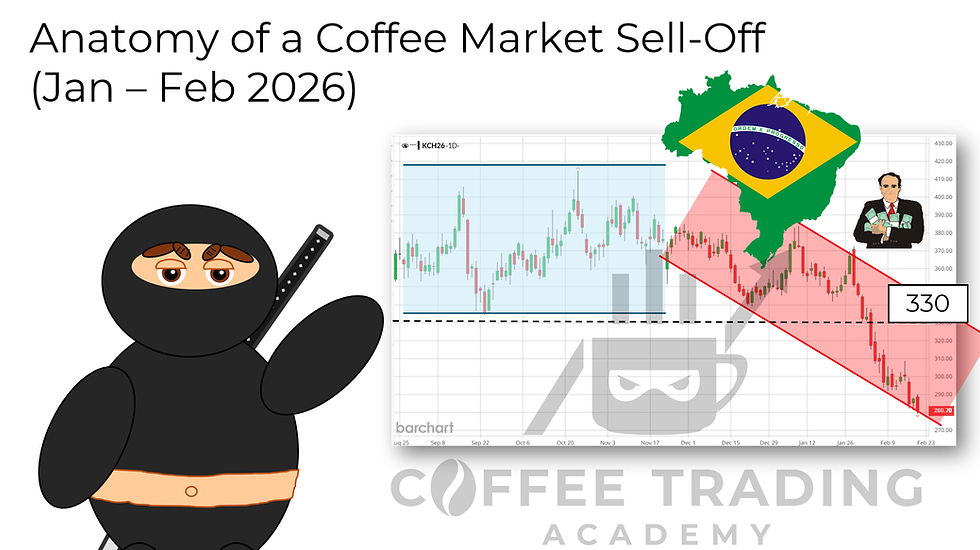Robusta Coffee – Bigger Production and Rise in Consumption
- Alexander Gruber
- Jul 24, 2025
- 3 min read

The expansion of Robusta coffee production in recent years has coincided with a rise in demand, as elevated Arabica prices push more buyers toward Robusta as a more economical option.
Between the 2016/2017 and 2020/2021 coffee crop cycles, the average annual demand for Robusta coffee was 70.34 million bags. The figure rose from 21/22 to 25/26, reaching 77.94 million bags annually, representing an increase of 11% that outpaced the one in Arabica, as during the same period, Arabica coffee consumption rose from 90.16 million bags to 94.72 million bags, representing an increase of 5%.

The leads to the question: what is the trajectory of this so-called "secondary quality coffee"?
The primary purchasers are the soluble coffee sector, succeeded by roasters specializing in Espresso blends, and lastly, the origin countries that prefer their coffee roasted exclusively with Robusta beans.
Vietnam is a notable example, particularly for its renowned Phin Coffee, which is served with ice and sweet condensed milk.
The soluble industry has developed various techniques to maximize oil extraction from beans, with Robusta beans exhibiting a higher extraction rate compared to Arabica beans.
Despite efforts to preserve aromas, soluble coffee differs in taste from freshly roasted and ground coffee, losing up to 50% of various aroma molecules during processing.
Moreover, soluble coffee presents an effective option for persuading tea drinkers to transition to coffee due to its convenience and rapid preparation. The availability of various 3-in-1 sachets on the market enhances convenience and ease of use.
[Don’t miss what’s happening in Vietnam. Contact info@coffeetradingacademy.com to purchase our reports.]
While specialty coffee shops rarely promote Robusta coffee prominently - as most roasters, brands, and consumers continue to regard Robusta as inferior in quality compared to Arabica - Robusta coffee beans, when meticulously selected and roasted, yield a rich flavor profile characterized by natural caffeine and notes of chocolate and tobacco aroma.
The final result is a coffee that exhibits a robust and rich flavor profile, making it ideal for individuals who prefer coffee with milk.
Ultimately, as markets mature, consumers exhibit increased curiosity and begin transitioning to premium Robusta and Arabica roasted and ground coffee. Arabica and Robusta are not rivals but different types of coffee. Each has its own profile, and liking one over the other is simply a matter of taste.
The competition in the beverage market is significant; however, we are confident that coffee will maintain its appeal as one of the most popular beverages. While production rises to match consumption, we’re left with one question: where will this additional coffee be cultivated?
Climate change is already impacting coffee production, and arabica trees exhibit greater sensitivity to changing climate conditions, such as increased temperatures and variations in seasonal precipitation, compared to Robusta trees.
Meanwhile, farmers find it significantly easier to cultivate and maintain Robusta trees compared to Arabica trees, which are frequently grown on steep and hard-to-access slopes.
Hence, the next 10 million bags of coffee production will likely come from Robusta and the consumption may adapt to it, which can include increased offering of Specialty Robustas as single origin and single coffee drinks.
Elite Insights – Vietnam Coffee Reports
Are you looking for consistent and trustworthy insights and crop survey reports on Vietnam Coffee?
We'd love for you to join us as a subscriber to stay ahead of the trend!
Elite Insights: Vietnam Crop Report
Our Vietnam Crop reports gives you access to in-depth, exclusive intelligence backed by decades of experience.
What’s included?
✅ Season open crop report and forecast
✅ Weekly key update
✅ Monthly summary, analysis an forecast report
✅ Season close crop report
What sets our report apart?
✅ Elite + Experienced Team: A team with decades of coffee trading expertise, providing forecasts that matter.
✅ Proprietary Data: Multiple rounds of crop tours, crop counting, and on-the-ground insights.
✅ Hard-to-Find Intelligence: Insight into physical prices (differentials), stock levels, exports, and local economic conditions.
Reach out to us at info@coffeetradingacademy.com for more information



Comments